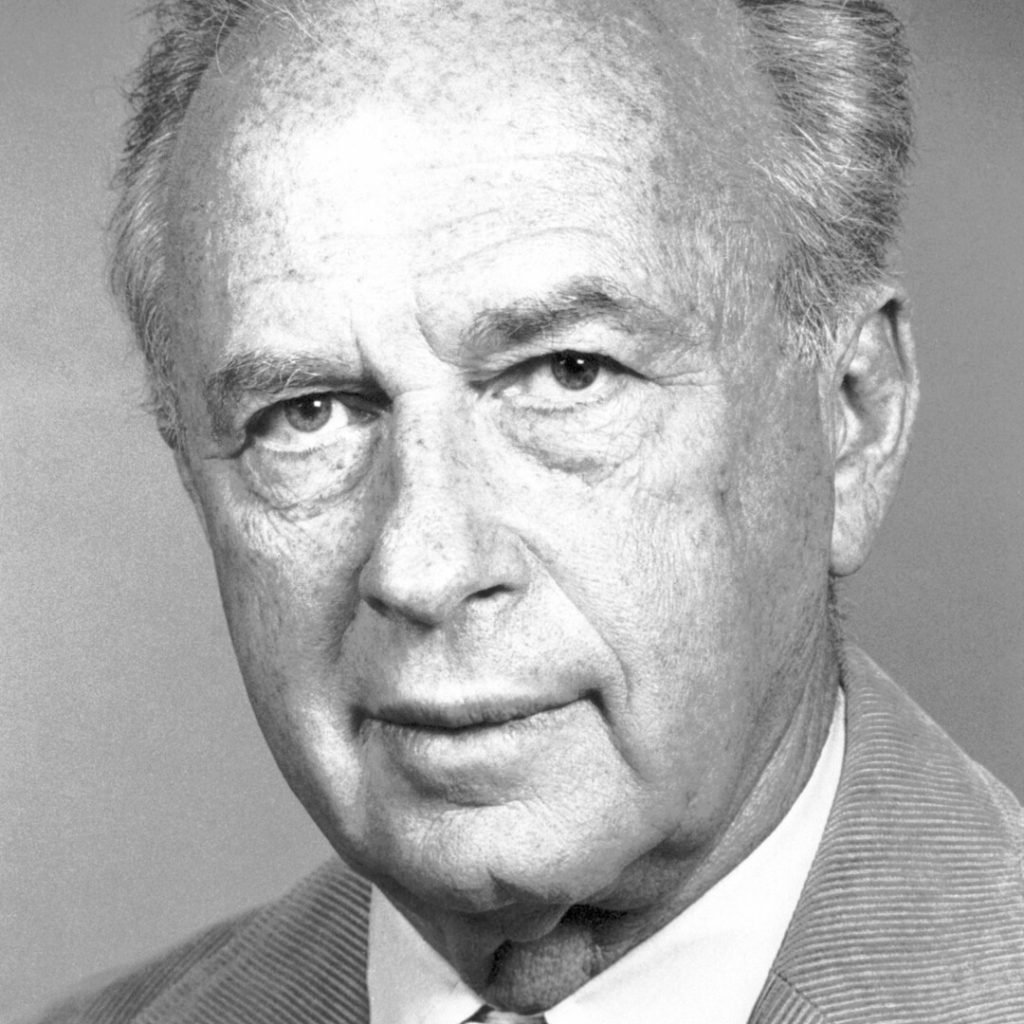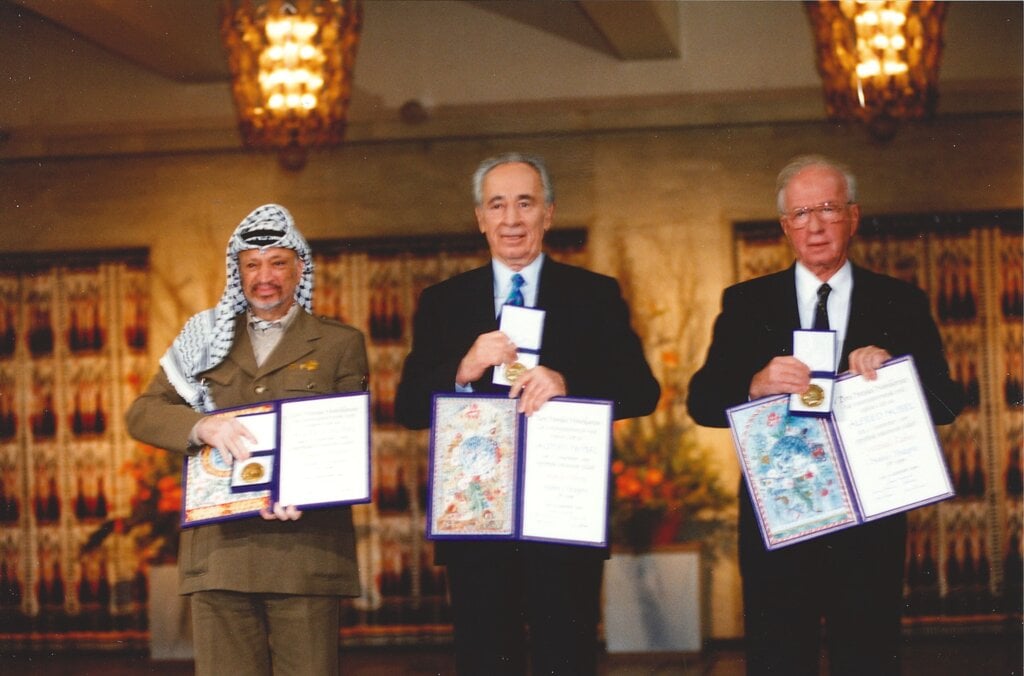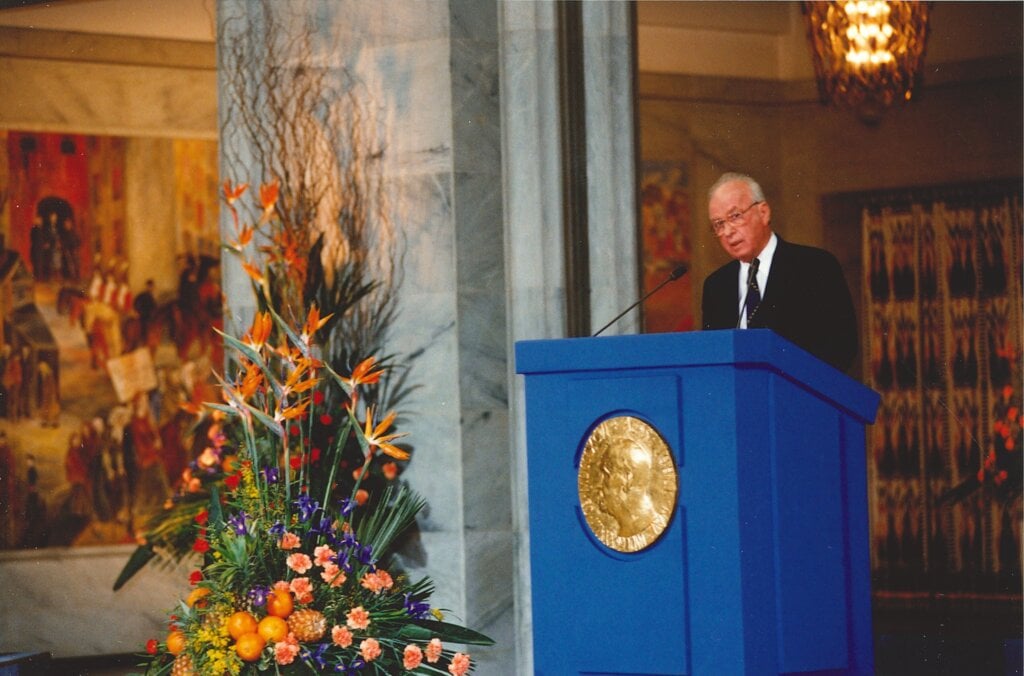Yitzhak Rabin
Speed read
Yitzhak Rabin was awarded the Nobel Peace Prize, jointly with Yasser Arafat and Shimon Peres, for his efforts to create peace in the Middle East.

Full name: Yitzhak Rabin
Born: 1 March 1922, Jerusalem, British Mandate of Palestine (now Israel)
Died: 4 November 1995, Tel Aviv, Israel
Date awarded: 14 October 1994
From militarism to reconciliation
The general who became prime minister, Yitzhak Rabin renounced violence in favour of negotiation in order to achieve peace with the Palestinians. Rabin fought in the 1948-49 Arab-Israeli war, eventually becoming Chief of Staff. He began his political career in the 1970s, competing with Shimon Peres for top Labour Party positions. In 1993, Rabin approved the Oslo Accord, which had been negotiated in secrecy in Norway, and which was signed the same year in Washington, DC. According to the agreement, Israel would gradually withdraw from the occupied territories, giving Palestinians self-rule. In 1994, Rabin shared the Nobel Peace Prize with Israeli Foreign Minister Shimon Peres and Palestinian leader Yasser Arafat. Jewish extremists saw the accord as a betrayal of fundamental principles. Rabin was assassinated in the autumn of 1995.

"I wish to salute all the fallen of all countries in all the wars; the members of their families who bear the enduring burden of bereavement; the disabled whose scars will never heal."
Yitzhak Rabin, Nobel Prize lecture, 10 December 1994.

Rabin, the warrior
Born in Jerusalem, Rabin fought alongside the British during WWII to prevent a German conquest of the Middle East. After the war, he fought against them because they tried to stop Jewish immigration to Palestine. When the Arabs declared war on the newly established state of Israel in 1948, Rabin distinguished himself in battle by securing a corridor between Jerusalem and the Mediterranean. But he also took part in an operation that drove 50,000 Palestinians from their homes in the town of Lydda. In 1964, Rabin became Chief of Staff of the Israel Defence Forces (IDF), leading Israel to a resounding victory over the Arabs in the 1967 Six-Day War.
"Rabin ... was willing to take calculated risks for peace. For without peace, he believed, Israel was taking the greatest risk of all – the risk of a new Holocaust perpetrated by fundamentalist and nationalist Arab forces possibly armed with nuclear weapons, germ bombs, and poison gas."
Dan Kurzman: “Soldier of Peace. The Life of Yitzhak Rabin”, page 518, HarperCollins 1998.
Rabin, the politician
After the 1967 Six-Day War, Rabin resigned as Chief of Staff of the IDF. He became the Israeli ambassador to the USA. He returned home in 1973 with political ambitions, joining the Labour Party and becoming prime minister the following year. Three years later he was forced to step down because his wife had a US bank account, in contravention of Israeli law. In the 1980s, Rabin served as the minister of defence, advocating a hard line in the occupied West Bank and Gaza. But he took a more conciliatory approach when he became prime minister again in 1992.
Rabin and the Oslo Accord
In 1987, Palestinians on the West Bank and in Gaza rebelled against the Israeli occupation. Defence Minister Yitzhak Rabin encouraged Israeli soldiers to break the arms and legs of the children and youths who threw stones at them. Photographs of this shocked the world, turning public opinion against Israel. Moreover, the Israeli hard line did not quell the unrest. In 1992, Rabin became prime minister. Foreign Minister Peres persuaded him to approve a peace treaty with Palestinian leader Yasser Arafat, which had been negotiated in Oslo. In his speech upon the signing of the Oslo Accord, Rabin said: “Enough of blood and tears. Enough.”
Rabin’s assassination
In 1994, many Israelis disapproved of the Israeli-Palestinian peace treaty. In 1995, protests escalated when Prime Minister Rabin signed an agreement giving Palestinians control over new areas of the West Bank. The Israeli right wing launched nasty personal attacks on Rabin. In one instance, demonstrators even went as far as to burn his effigy clad in a Nazi uniform. A young student decided that Rabin deserved to die for handing over Jewish land to the Palestinians. He fired three bullets into Rabin’s back in November 1995, killing him in the midst of a peace demonstration in Tel Aviv.
| Oslo Accord Peace treaty between Israel and the Palestinian Liberation Organisation (PLO) negotiated in Oslo in 1993. Most importantly, the parties officially recognised one another and agreed that negotiations should replace the use of weapons. |
Learn more
Yitzhak Rabin was born in Jerusalem in 1922; he studied at the Kadoorie Agricultural College where he graduated with distinction. His military career began in 1940 when he joined the “Palmach”, the elite unit of the Haganah ...
Disclaimer: Every effort has been made by the publisher to credit organisations and individuals with regard to the supply of photographs. Please notify the publishers regarding corrections.
Nobel Prizes and laureates
Six prizes were awarded for achievements that have conferred the greatest benefit to humankind. The 12 laureates' work and discoveries range from proteins' structures and machine learning to fighting for a world free of nuclear weapons.
See them all presented here.
